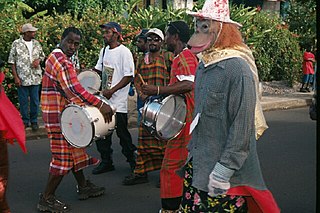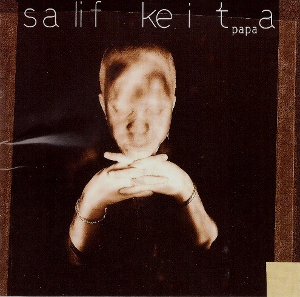
Funk is a music genre that originated in African-American communities in the mid-1960s when musicians created a rhythmic, danceable new form of music through a mixture of various music genres that were popular among African-Americans in the mid-20th century. It deemphasizes melody and chord progressions and focuses on a strong rhythmic groove of a bassline played by an electric bassist and a drum part played by a percussionist, often at slower tempos than other popular music. Funk typically consists of a complex percussive groove with rhythm instruments playing interlocking grooves that create a "hypnotic" and "danceable" feel. It uses the same richly colored extended chords found in bebop jazz, such as minor chords with added sevenths and elevenths, and dominant seventh chords with altered ninths and thirteenths.
Jazz is a music genre that originated in the African-American communities of New Orleans, Louisiana, in the late 19th and early 20th centuries, with its roots in blues, ragtime, European harmony and African rhythmic rituals. Since the 1920s Jazz Age, it has been recognized as a major form of musical expression in traditional and popular music. Jazz is characterized by swing and blue notes, complex chords, call and response vocals, polyrhythms and improvisation.

Polyrhythm is the simultaneous use of two or more rhythms that are not readily perceived as deriving from one another, or as simple manifestations of the same meter. The rhythmic layers may be the basis of an entire piece of music (cross-rhythm), or a momentary section. Polyrhythms can be distinguished from irrational rhythms, which can occur within the context of a single part; polyrhythms require at least two rhythms to be played concurrently, one of which is typically an irrational rhythm. Concurrently in this context means within the same rhythmic cycle. The underlying pulse, whether explicit or implicit can be considered one of the concurrent rhythms. For example, the son clave is poly-rhythmic because its 3 section suggests a different meter from the pulse of the entire pattern.
In music, an ostinato is a motif or phrase that persistently repeats in the same musical voice, frequently in the same pitch. Well-known ostinato-based pieces include classical compositions such as Ravel's Boléro and the Carol of the Bells, and popular songs such as Donna Summer and Giorgio Moroder's "I Feel Love" (1977), Henry Mancini's theme from Peter Gunn (1959), The Who's "Baba O'Riley" (1971), The Verve's "Bitter Sweet Symphony" (1997), and Flo Rida's "Low" (2007).

Zimbabwean music is heavily reliant on the use of instruments such as the mbira, Ngoma drums and hosho. Their music symbolizes much more than a simple rhythm, as the folk and pop style styled music was used as a symbol of hope for Zimbabweans looking to gain independence from Rhodesia. Music has played a significant role in the history of Zimbabwe, from a vital role in the traditional Bira ceremony used to call on ancestral spirits, to protest songs during the struggle for independence. The community in Zimbabwe used music to voice their resistance to their oppression, as one of the only weapons they had available to fight back with. In the eighties, the Music of Zimbabwe was at the center of the African Music scene thanks to genres such as Sungura and Jit. However, several performers were banned by state TV and radio leading to the closing of several music venues.

The music of Dominica includes a variety of genres including all the popular genres of the world. Popular music is widespread, with a number of native Dominican performers gaining national fame in imported genres such as calypso, reggae, soca, kompa, zouk and rock and roll. Dominica's own popular music industry has created a form called bouyon, which combines elements from several styles and has achieved a wide fanbase in Dominica. Groups include WCK, Native musicians in various forms, such as reggae, kadans (Ophelia Marie, and calypso, have also become stars at home and abroad.

Trilok Gurtu is an Indian percussionist and composer whose work has blended the music of India with jazz fusion and world music.

The music of Suriname is known for kaseko music, and for having an Indo-Caribbean tradition.

Shobha Gurtu (1925–2004) was an Indian singer in the light Hindustani classical style. Though she had equal command over pure classical style, it was with light classical music that she received her fame, and in time came to be known as the Thumri Queen, and for the 'Abhinaya' sung in her full-throated voice.

Oregon is an American jazz and world music group, formed in 1970 by Ralph Towner, Paul McCandless, Glen Moore, and Collin Walcott.
Ethno jazz, also known as world jazz, is a subgenre of jazz and world music, developed internationally in the 1950s and '60s and broadly characterized by a combination of traditional jazz and non-Western musical elements. Though occasionally equaled to or considered the successor of world music, an independent meaning of ethno jazz emerged around 1990 through the commercial success of ethnic music via globalization, which especially observed a Western focus on Asian musical interpretations. The origin of ethno jazz has widely been credited to saxophonist John Coltrane.

Kai Eckhardt is a German born musician and composer who plays bass, best known for his work with John McLaughlin, Vital Information, Torsten de Winkel, Billy Cobham and Garaj Mahal—a band he co-founded. Educated at the prestigious Berklee College of Music Eckhardt has also collaborated on projects with guitarist Larry Coryell as well as keyboardist Tom Coster. Eckhardt is known for his fast chordal slap-style abilities, and for his unique combination of funk, jazz, and world music.

Roopkumar Rathod is an Indian music director and playback singer and Indian pop singer. He has performed a number of songs in Hindi, Gujarati, Marathi, Tamil, Telugu, Bengali, Oriya, Assamese, Nepali, Bhojpuri and Kannada films.
Mark Nauseef is an American drummer and percussionist who has enjoyed a varied career, ranging from rock music during the 1970s with his time as a member of the Ian Gillan Band and, temporarily with Thin Lizzy when Brian Downey left for a short time, to a wide range of musical styles in more recent times, playing with notable musicians from around the world.

Doudou Gouirand is a French jazz saxophonist and composer.

Qué Alegría is an album by the John McLaughlin Trio, featuring percussionist Trilok Gurtu and bass guitarist Dominique Di Piazza. Di Piazza is replaced by Kai Eckhardt on two tracks. It was released on the Verve label in 1992. The album reached 1992 number 5 in the Billboard Top Contemporary Jazz Albums chart.
Henrik Andersen is a Danish jazz guitarist, singer-songwriter, multi-instrumentalist, and vocal percussionist. Among his instruments is a fifty-two string guitar made for him by Linda Manzer.

C'est la Vie is an album by the Cameroonian musician Henri Dikongué. It was released in 1997.

Mongo Returns! is an album by the Cuban musician Mongo Santamaría. It was released in 1995. The album marked Santamaria's return to the Fantasy Records label.

Papa is an album by the Malian musician Salif Keita, released in 1999. It is a tribute to Keita's father, who died in 1995. Keita supported the album with a European tour. The album was nominated for a Grammy Award for "Best World Music Album".















